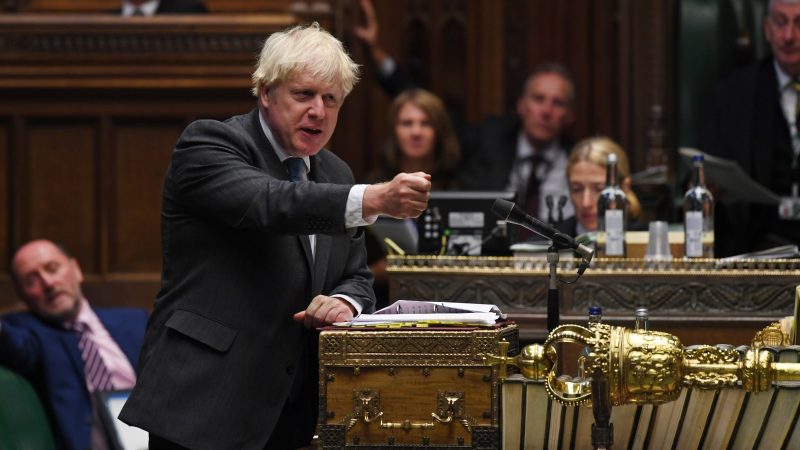
The internal market bill is a depressing picture of the next four years. Tory rebellions collapse like a pack of cards, ensuring there is no Commons check on the excesses of the government. And the law is blithely and openly treated with contempt.
Labour wants to get Brexit done. We want the government to succeed in securing a deal in the national interest and to protect the Good Friday Agreement. Like the rest of the country, we want to move on from Brexit and see the UK making future trade deals across the world.
Instead, we are faced with having to deal with a government whose priorities are a combination of unpicking their own “oven-ready” deal, undermining the word and integrity of the UK on the world stage, and breaking the law. All of this government time would be better spent focusing on achieving future trade deals and our pandemic response.
With the honourable exception of Lord Keen, the lawyers in the government stay nailed to their red boxes mouthing empty platitudes about what breach of the law (in the future, obviously) would make them resign. The legal community, which includes the last Lord Chief Justice, the Law Society, the Bar Council and the last three Attorney Generals, look on appalled at this dereliction of duty. Dominic Cummings no doubt congratulates himself on thinking that his contempt for the lawyers in government turned out to be justified.
The government have now published their amendments to the internal market bill, to give effect to the Neill amendment. It is crystal clear that the rebels have got next to nothing. It may salve their consciences but it does not remotely solve the illegality. This is no climbdown – it’s a doubling down. With the rebels’ specific agreement, the government have produced a further amendment restricting people’s right to mount any court challenge against an exercise of the powers given by the bill.
No 10 has issued a written statement saying that unless the EU agree to each one of the UK’s demands in the discussions in the joint committee, the UK will breach the withdrawal agreement. And it gets worse. The written statement makes it clear there are wider breaches of the withdrawal agreement yet to come in the finance bill. No wonder No 10 officials are briefing now that the agreement “strengthens” the controversial provisions in the bill.
The withdrawal agreement contains provisions that the UK will implement it in good faith and do nothing to jeopardise the attainment of its objectives. This is an inevitable part of an international agreement like this one. If a country seeks to pass, and then does pass, legislation empowering it to break an international agreement, with the obvious intention that its negotiators should be able to threaten the other party that if they do not agree to a new demand they will act in breach of the agreement, it is hardly surprising that giving yourself those powers is itself a breach of international law. Neither the government nor expert lawyers dispute this. And that is precisely what the government is now doing.
It may be that the EU and the UK reach both a trade deal and an agreement on how the Northern Ireland protocol should work. It’s in both parties’ interests that they do. Those agreements were patently available to the UK without this reckless breach of international law. Let us be clear that whatever the outcome, we will pay a reputational price, a price in our moral standing and in our ability to promote our values internationally, but also an economic price.
Behaving like this takes huge risks for our economy, as future partners doubt whether we will really keep our word. As Paul Johnson of the Institute of Fiscal Studies wrote in The Times on Monday, the rule of law has been one of the long-term foundations of the growth of our economy. The pound dipping when the law breaches were announced proved that.
And it promotes our trade abroad. Other countries do business with us, enter trade deals with us and allow our business to access their markets because they trust our government to stand by its words. How could we be as stupid as this government is being to endanger that? The leader of the majority party in the US House of Representatives has said they would block any deal with the UK if we break the NIP.
Ultimately, what we are facing is a world where the Conservative Party has ceased to be the party that seeks to conserve the basic foundational values of our country, such as the rule of law. Whether the government gets its way or not, we cannot ignore the profound implications for our country and its governance.
Lord Keen could not stay in the government because he knew this would mean crossing a Rubicon. Those who do not follow his example – particularly those with responsibilities in government to fight for law, or ministers who are also lawyers – should be under no illusions that they are conspiring in the breach of the fundamental principles on which our country was built. Their betrayal of those principles will not be forgotten or forgiven.




More from LabourList
Government announce SEND reform in schools white paper
SPONSORED: ‘Industrial hemp and the challenge of turning Labour’s priorities into practice’
‘A day is a long time in politics, so we need ‘action this day’’